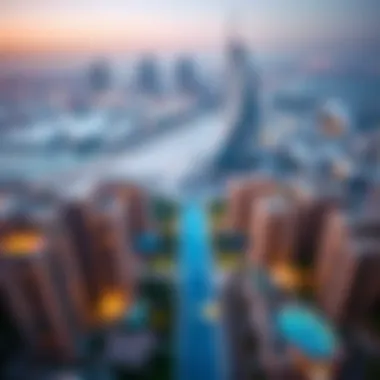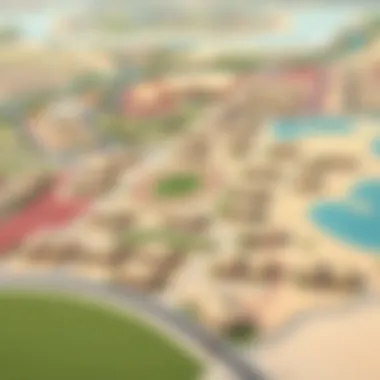Understanding Manazil: Housing in Dubai's Real Estate Market


Intro
Navigating the housing landscape in Dubai can feel like wandering through a maze, especially with the unique cultural and economic dynamics at play. One of the key concepts that underpin this landscape is manazil, a term that broadly refers to various types of homes available in the city. Understanding manazil is essential for anyone looking to buy, rent, or invest in property. Whether you're a seasoned investor or a first-time homebuyer, knowing the ins and outs of manazil can empower you to make more informed decisions in a market that's as dynamic as the city itself.
Dubai, the jewel of the United Arab Emirates, boasts an impressive array of housing options ranging from high-end villas in Palm Jumeirah to sleek apartments in Downtown Dubai. These options are not only influenced by the soaring skyline and luxurious lifestyle but also by regulations and market trends that determine how and where people live. As we delve deeper into the concept of manazil, we will unpack the current market trends, explore various property types, and offer insights that are vital for navigating the complex housing terrain in this bustling metropolis.
Stay tuned as we explore the nuances of manazil to help you find your footing in Dubai's exhilarating real estate market. The journey starts now.
Understanding Manazil: A Cultural Perspective
The term manazil, translating to "homes" or "dwellings" in Arabic, symbolizes more than just a physical shelter in Dubai; it conveys the very essence of community and identity. Understanding manazil within the cultural fabric of this vibrant city is crucial, especially for those who wish to immerse themselves in its rich heritage while navigating the housing market.
Definition of Manazil
At its core, manazil encompasses a variety of living spaces, ranging from luxurious villas to modest apartments. This term embodies both traditional and modern housing styles, reflecting the diverse demographics of Dubai. The architecture varies significantly – from the iconic skyscrapers that tower over the skyline to quaint low-rise buildings with Emirati charm.
Each type of manzil serves a unique function, catering to the needs of various cultural communities that call Dubai home.
In essence, manazil is not merely about walls and roofs; it’s about belonging. It’s where families gather, traditions are nurtured, and memories are forged. For example, a high-rise apartment in Dubai Marina offers city-dwelling convenience, while a villa in Arabian Ranches provides a more spacious, family-oriented lifestyle.
Cultural Significance of Manazil
The cultural significance of manazil transcends its basic definition. It represents a convergence of history, values, and the modern aspirations of a rapidly evolving society. In a city known for its cosmopolitan nature, manazil becomes a symbol of coexistence between various cultures. This is particularly evident in neighborhoods like Al Fahidi, where traditional architectural styles reflect Dubai’s storied past, alongside newer developments that showcase contemporary trends.
"A home is not just a building; it is a vessel of memories, dreams, and aspirations. In Dubai, manazil encapsulates the diversity and unity of its residents."
The social gatherings that take place within manazil are vital for maintaining cultural practices. From hosting festivals to family celebrations, each home plays a role in fostering community ties. The importance of manazil also manifests in the sense of security and comfort it provides. For many expatriates and locals alike, finding the right manzil is akin to discovering a personal sanctuary amid the bustling city life.
Types of Manazil in Dubai
Understanding the types of manazil available in Dubai is critical for anyone looking to fully grasp the housing landscape in this bustling metropolis. With a rich tapestry of residential, commercial, and mixed-use developments, this nuanced understanding not only informs potential buyers but also enhances the decision-making process for investors, property managers, and renters alike.
In the following sections, we will break down each type of manazil, exploring their unique characteristics, benefits, and the considerations that come with them.
Residential Manazil
Residential manazil encompasses a broad range of living spaces designed primarily for households. This section is fundamental for buyers and renters because it includes everything from luxury villas to affordable apartments.
- Diverse Options
The residential sector is a feast for the eyes with options like high-rise apartments, cozy townhouses, and expansive villas. Each type offers a distinct lifestyle choice. Buyers can find themselves in a bustling community or a quiet suburban setting based on their needs. - Amenities and Services
Most developments come with a handful of perks—swimming pools, fitness centers, and green parks. Many complexes also feature convenient proximity to retail and entertainment options, making day-to-day living a lot easier. - Consideration of Costs
Prices can range significantly. For instance, a high-end apartment in Dubai Marina can hit the wallet hard compared to a modest flat in Deira. Understanding the financial landscape is crucial for making informed choices, especially for first-time buyers aiming to make their mark in Dubai's vibrant market. - Community and Lifestyle
Each residential area has its own vibe often attracting similar demographics. Whether it’s families flocking to the outskirts or young professionals crowding urban centers, the community feel is a big player in the residential sector.
Commercial Manazil
Commercial manazil play a vital role in the dialogue about Dubai's economy. These properties are primarily aimed at businesses and retail establishments and often include offices, shops, and mixed-use buildings designed for commercial activity.
- Economic Significance
The importance of commercial manazil cannot be overstated. They contribute to the local economy by generating jobs and attracting businesses to the area. A well-placed office tower can not only benefit its occupants but also elevate the surrounding real estate market. - Investment Insights
Investors focusing on commercial properties often expect higher returns than residential deals. However, risks are equally more pronounced—market demands, location desirability, and economic shifts can impact profitability. - Location Considerations
The position of commercial manazil can make or break a business. Properties in business hubs like the Dubai International Financial Centre or the Dubai World Trade Centre often see high foot traffic, resulting in more opportunities and expansion for businesses. - Regulatory Environment
Navigating the regulations affecting commercial properties is crucial for investors and tenants alike. Knowledge of zoning laws, lease agreements, and compliance issues is necessary to avoid potential pitfalls.
Mixed-Use Developments
Mixed-use developments are noteworthy in the current market, representing a blend of residential, commercial, and sometimes even recreational spaces within a single development. This innovative approach is reshaping urban living in Dubai.
- Integration of Spaces
These developments often incorporate living, working, and leisure areas into one cohesive space, leading to a vibrant community atmosphere. Think about grabbing groceries on the ground floor and heading home just a few flights up. - Advantages for Investors
The appeal of mixed-use developments extends to investors as well. With multiple revenue streams, these projects can provide a buffer against market volatility—if one segment performs poorly, others may compensate. - Urban Planning Impact
As Dubai continues to grow, mixed-use developments propose a sustainable approach to urban planning. They promote walkability and reduce reliance on cars, which is essential for the city’s environmental aims. - Community Convenience
Living in a mixed-use development can simplify life. Residents can enjoy easy access to shops, restaurants, and services without straying far from their residences, fostering a sense of belonging and engagement within the community.
In summary, grasping the different types of manazil in Dubai sheds light on unique opportunities and considerations across the housing landscape. This knowledge is essential for making savvy choices, whether you’re a buyer, investor, or renter.
Current Trends in the Dubai Housing Market
Dubai's housing market is a complex tapestry, constantly woven with new threads of innovation, investment, and cultural shifts. Understanding current trends is pivotal for buyers and investors aiming to make informed decisions. The market reflects not just economic stability but also how social behaviors are adapting in the face of changing global dynamics. As such, grapsing these trends helps stakeholders recognize opportunities and prepare for obstacles in this dynamic environment.
Market Stability and Growth
The recent years have painted a picture of relative stability in the Dubai housing market. While other real estate markets elsewhere fluctuate wildly, Dubai has cultivated a reputation for resilience. Population growth, spurred on by an influx of expatriates and tourists, has effectively kept demand high.
Interestingly, the government has put in mechanisms to bolster this market, like visa reforms that make it easier for talented individuals to settle in the region. This incentivizes investment and enhances the appeal of manazil for various demographics. Buyers these days are looking beyond luxury; they want durability and community integration, factors that encourage developers to innovate.
In particular, properties in prime locations are seeing consistent appreciation, while affordable housing options are expanding as developers pivotative. A careful analysis of recent years shows that home prices have softened but not crashed— a sign that buyers could be more judicious without fearing a sudden boom in speculation.
Emerging Neighborhoods
As Dubai continues to grow, some areas are becoming hotbeds for potential investors and residents alike. Neighborhoods like Dubai Creek Harbour and Mohammed Bin Rashid City are making waves in the market, driven primarily by ambitious urban development projects. These neighborhoods boast a blend of residential, commercial, and recreational spaces, paving the way for a more holistic living experience.
Investors are keeping a close eye on these emerging hotspots for various reasons:
- Affordability: Many of these neighborhoods offer properties that are not just affordable but also promise healthy annual returns on investment.
- Accessibility: Infrastructure developments, including new metro lines and roads, make it easier for residents to commute, addressing one of the biggest concerns for city dwellers.
- Community-oriented Designs: Urban planners are focusing on mixed-use spaces that promote community interactivity, making these locations appealing to families and young professionals.
Impact of Global Events


The ripple effects of global happenings invariably touch the Dubai housing market. Recent global crises, be they health-related or economic, have reshaped investment patterns and buyer confidence. For instance, during the pandemic, there was a shift towards larger homes with outdoor spaces, revealing a new priority among buyers for personal comfort.
Additionally, as energy prices fluctuate on the world stage or geopolitical tensions rise, property investors have to adjust their strategies. Many are looking to invest in sustainable manazil that align with global green initiatives.
Investors should monitor these trends and adapt their portfolios accordingly. Whether it's by jumping on eco-friendly developments or considering properties that are likely to gain value in light of global shifts, being proactive is key.
"Understanding these trends isn't just about numbers— it's about recognizing the community's aspirations and responding to them thoughtfully."
Investment Opportunities in Dubai Manazil
Investing in manazil in Dubai is more than just a financial move; it is an opportunity to tap into one of the most rapidly developing real estate sectors globally. With its strategic location, robust economy, and multicultural environment, Dubai presents a variety of investment opportunities that can yield substantial returns. Understanding these opportunities involves recognizing market dynamics, potential risks, and the distinctive aspects of manazil that could influence one's investment decisions.
The housing market in Dubai is notably diverse, offering everything from luxurious villas to affordable apartments. Old or new, each type of manazil has its unique appeal, thus providing investors options to cater to varying demographics. This landscape is constantly evolving, meaning what may seem as a good investment today might look different in the coming years. Therefore, staying informed is key to making sound investment choices.
Understanding ROI for Properties
Understanding the Return on Investment (ROI) for properties in Dubai is crucial for anyone looking to invest in manazil. ROI helps investors gauge the profitability of their investments. In Dubai, the average annual rental yield tends to hover around 7% to 9% in several areas; however, this can vary based on location, property type, and market conditions.
To be more precise about calculating ROI:
- Calculate Net Income: This includes total rental income minus expenses such as maintenance, property management fees, and taxes.
- Establish Property Value: Knowing the current market value of the property can help in understanding potential appreciation.
- Use the Formula: ROI = (Net Income / Property Value) x 100.
By focusing on the fundamentals of property investment, investors can determine whether a particular manzil aligns with their financial goals.
Identifying Lucrative Locations
Location remains one of the most critical factors when considering investment in manazil. Well-placed properties tend to attract tenants, offer more significant appreciation potential, and ensure steady cash flow. Investors should consider areas like Dubai Marina, Downtown Dubai, and Jumeirah Village Circle for high demand.
Key indicators to identify lucrative spots include:
- Infrastructure Development: Future projects such as metro stations or commercial centers can influence property values.
- Market Trends: Keep an eye on emerging neighborhoods that show promising growth.
- Demographic Research: Understanding the needs of potential tenants can help determine the most suitable manazil.
Tax Considerations for Investors
When it comes to investing in manazil in Dubai, tax considerations can play a pivotal role. Thankfully, Dubai offers a tax-friendly environment, notably with no annual property taxes. However, investors should still be aware of some financial obligations:
- Property Registration Fees: Investors typically need to pay a fee of 4% of the property’s purchase price.
- Service Charges: Ongoing monthly costs can add up, depending on property type and developer.
- Capital Gains Tax: While Dubai has no capital gains tax, it’s important to be cognizant of potential changes in tax laws.
"Investing in Dubai property is more than just acquiring manazil; it’s about embracing a lifestyle embedded in a thriving recognition of culture and commerce."
For more insights, resources regarding the Dubai real estate market can be found at Dubai Land Department and Invest Dubai.
Legal Considerations When Buying Manazil
Understanding the legal framework behind buying manazil in Dubai is not just a matter of formality; it's an absolute necessity. This section will unravel crucial elements of property ownership laws, the purchase process, and essential documentation that buyers need to navigate.
Property Ownership Laws
In Dubai, property ownership laws can be quite rigorous and vary significantly depending on the type of property and the buyer's residency status. UAE nationals and GCC citizens enjoy full ownership rights under the emirate's real estate regulations. On the other hand, foreign investors are often limited to specific areas designated as freehold zones, where they can hold 100% ownership. This can include areas like Dubai Marina, Downtown Dubai, and several other premium locations.
Before engaging in a purchase, potential buyers must familiarize themselves with key terms like 'freehold' and 'leasehold'. Freehold properties allow for complete ownership, whereas leasehold properties often involve ownership for a predetermined period, typically up to 99 years.
It's prudent for buyers to consult with legal experts to ensure clarity about any upcoming regulations or amendments. Being proactive can save one from unexpected pitfalls down the road. For instance, understanding how various laws may affect potential resale or inheritance of the property is vital.
Navigating the Purchase Process
The purchase process for real estate in Dubai can feel like running a marathon—complex, extensive, and sometimes overwhelming. Here’s a simple breakdown to alleviate some of that pressure:
- Engage a Trusted Real Estate Agent: Start by identifying a reputable agent specializing in Dubai's housing market. Their familiarity with local dynamics can greatly assist in finding the right manazil.
- Property Viewing: Narrow your options based on your requirements and preferences. Schedule viewings to get a feel for the property and its surroundings.
- Offer and Negotiation: If a property piques your interest, make an offer. Negotiation is often part of the deal, so don’t shy away from discussing terms and conditions that work for you.
- Legal Due Diligence: Conduct thorough checks to ensure the property is encumbrance-free. Your agent will typically help with coordinating property surveys and title checks.
- Agreement Signing: Once negotiations are complete, you will sign a Memorandum of Understanding (MOU) and pay a deposit, often around 10% of the purchase price.
- Transfer of Ownership: This step usually occurs at the Land Department, where further fees may apply. Make sure you have all required documentation, including proof of identity and financial capability.
Navigating through these steps carefully can mitigate potential legal issues and ensure a smoother purchase experience.
Understanding Property Documentation
Proper documentation is akin to having a sturdy map for a journey. Here are key documents you should be familiar with:
- Title Deed: This is perhaps the most crucial document which serves as proof of ownership. Ensure that the title deed is verified and registered in your name at the Land Department.
- Sale and Purchase Agreement (SPA): This legal contract lays out the terms of the sale and should specify purchase price, payment schedules, and other obligations.
- No Objection Certificate (NOC): Required from the developer, confirming that there are no outstanding dues on the property.
- Identification Documents: Such as Emirates ID or passport copies; necessary for registration and compliance purposes.
Renting Manazil: A Practical Guide
Renting a manzil in Dubai can be a real game-changer, not just for families looking for their next home but also for investors eyeing the rental market. Given the fast-paced nature of the city's real estate, understanding the ins and outs of renting is essential. It’s not just about finding a place to live; it’s about making informed choices amid a vibrant and sometimes overwhelming landscape.
Finding Rental Properties


The first step in finding a rental property in Dubai is navigating through the plethora of listings available. Websites like Dubizzle and Property Finder are treasure troves of information, displaying a range of options from cozy apartments in Deira to luxurious villas in Dubai Hills.
When searching, it pays to be specific about your requirements. Think about what aspects matter most, such as proximity to schools, public transport, or shopping areas. Consider creating an online shortlist of properties that check all your boxes.
Don’t forget to consider local real estate agencies. They often have exclusive listings that you might not spot online. A reputable agency can offer you valuable advice and guide you through the maze of paperwork involved in the rental process. Always remember, one person's dream apartment could be another’s nightmare. Keep your options open and tour a few places before making a decision.
Lease Agreements and Regulations
After finding your dream manzil, the next essential step is understanding lease agreements. These documents can sometimes read like a foreign language with all the formal jargon thrown in.
Standard renting periods in Dubai can vary, often ranging from one to three years. Be aware of any clauses such as termination notices and renewal options. It’s crucial to read the fine print before signing on the dotted line. Here’s a quick overview of what to pay attention to:
- Duration of Lease: Ensure you understand the minimum period of stay.
- Rent Payment Terms: Clarify whether you will pay monthly or upfront.
- Maintenance Responsibilities: Know who takes care of repairs to avoid future disputes.
- Security Deposits: This is usually equivalent to one month’s rent; ensure this is detailed in the contract.
Tip: Always request your lease agreement in both English and Arabic to ensure you’re covered on all fronts.
Tenant Rights in Dubai
Understanding tenant rights in Dubai is paramount for a smooth renting experience. Renters are protected under the Dubai Law No. 26 of 2007, ensuring fairness in landlord-tenant relationships. Here are some key rights for tenants:
- Right to Dignified Living Conditions: Your rented manzil must meet basic safety and livability standards.
- Protection Against Unfair Termination: Landlords can't evict tenants without just cause or proper notice.
- Right to Privacy: Landlords should provide notice before visiting the property, preserving your peace of mind.
- External Property Modifications: If you want to personalize your space, it requires landlord approval, so keep that communication open.
Being informed about these rights means you walk into your rental situation with confidence. Moreover, if any disputes arise, know that you can always reach out to the Rental Disputes Center for resolution.
Navigating the rental market in Dubai may come with its challenges, but being well-prepared can turn those hurdles into stepping stones for a successful renting experience. Remember, your manzil is not just a house; it is the comfort zone where memories are made.
The Role of Real Estate Agencies in Dubai
In Dubai, real estate agencies are not just service providers; they act as vital navigators in the intricate housing landscape. Their importance stems from several factors, including the myriad options available for buyers and renters, the legal complexity of transactions, and the need for localized market knowledge. Whether one is interested in investing, securing a lease, or acquiring property, an adept real estate agency can streamline the process and provide specialized insight.
Engaging with these agencies can offer substantial benefits, such as enhanced market access and negotiation leverage, which are crucial for making informed decisions. Moreover, with an ever-evolving property landscape, agencies often provide the latest updates and trends, helping clients stay ahead of the curve in this vibrant marketplace.
How Agencies Operate in Dubai
Real estate agencies in Dubai usually work under a regulatory framework defined by the Real Estate Regulatory Agency (RERA). They help clients navigate both buying and renting processes across various types of properties, from luxury villas in Palm Jumeirah to more modest apartments in Al Quoz.
The operational model consists of several key activities:
- Market Analysis: Agencies conduct in-depth research to understand market trends and property values. This analysis aids clients in assessing investment opportunities and making data-driven decisions.
- Property Listings: Agencies maintain comprehensive listings of available properties. They employ various marketing strategies to showcase these properties effectively, aiming to match them with potential clients.
- Client Representation: When engaging in negotiations, agencies act as the primary intermediaries. They leverage their understanding of the market and local practices to advocate for their clients, ensuring that interests are well-represented.
- Legal Guidance: Given the regulatory aspects involved, agencies often provide insights into the legal requirements for buying or renting property. They help clients understand essential paperwork, contracts, and necessary compliance, reducing the potential for legal pitfalls.
Choosing an Agency: What to Consider
Selecting the right real estate agency is pivotal for a successful experience in Dubai's housing market. Here are several factors to think about:
- Reputation and Experience: Look for agencies with a solid reputation and extensive experience in the Dubai real estate sector. User reviews, testimonials, and industry recognition can be telling indicators of an agency's reliability.
- Local Market Knowledge: Opt for agencies that possess a deep understanding of the specific neighborhoods and property types of interest. Local expertise can significantly enhance the search experience, whether it’s for luxury homes or affordable rental units.
- Service Range: Consider whether an agency offers comprehensive services, including property management, legal advisory, and post-purchase support. A full-service agency can be a great asset, especially for first-time buyers or international investors.
- Communication Style: It’s crucial to find an agency that communicates openly and effectively. This relationship will be essential throughout a potentially long and involved process.
- Fees and Commission Structure: Lastly, clarify the fees upfront. Different agencies have varying commission structures, and understanding the cost implications will help avoid surprises.
"The right agency can make all the difference in navigating Dubai's vibrant yet complex housing market."
Engaging a skilled real estate agency is a strategic move for anyone looking to explore the diverse offerings of manazil in Dubai. By choosing wisely, clients can benefit from expert guidance and tailored services, ultimately leading to a more successful real estate venture.
Financing Your Manazil
Navigating the financial aspect of acquiring manazil in Dubai can be as intricate as a tapestry. It is essential for buyers and investors to grasp not just the monetary figures involved but also the various financing methods available. Selecting the right route for financing isn't just a matter of convenience; it's a critical factor that can influence one’s long-term financial health and property value. The importance of understanding this landscape cannot be overstated.
First off, securing financing means understanding your own budget. This involves more than just the cost of the property. One needs to account for additional expenses like land registration fees, service charges, and maintenance costs that often come with property ownership. Not being aware of these can lead to financial headaches down the road.
Furthermore, buyers are faced with a myriad of options, each with its pros and cons. From traditional bank loans to newer financial instruments, every choice carries its own set of considerations. The details can be overwhelming, thus making it paramount to conduct thorough research and potentially consult with experts.
Understanding Mortgage Options
When living in a fast-paced real estate market like Dubai, it's important to familiarize oneself with various mortgage options. Bank loans often come to mind first. Typically, banks like Emirates NBD or Abu Dhabi Commercial Bank offer home loans with varying interest rates and terms. They provide long-term financing options, usually ranging from 15 to 30 years. However, lenders will meticulously assess one's financial history and credit score before offering a loan.
In addition, there's the option of Islamic financing. This type of financing abides by Sharia law, and financial institutions like Dubai Islamic Bank specialize in such products. They allow for the purchase of property without charging interest, doing this through agreements like Murabaha or Ijara. This route proves advantageous for those looking to align their financial practices with their values.
As you explore mortgage avenues, remember that the lower interest rates and flexible repayment terms can make a significant difference in your financial stability in the long run.
Also, the emergence of FinTech companies introduces alternative financing solutions. Platforms like Ajar Online allow users to manage rental payments effectively, making it easier for landlords and tenants alike. A combination of technology and traditional financing can often yield unique benefits that fit one’s individual needs.
Government and Private Financing Schemes
Understanding local financing schemes is crucial for both investors and homebuyers. The Dubai government has initiated several programs aimed at making property ownership more accessible. For instance, the Mohammed Bin Rashid Housing Establishment has ongoing initiatives that promote affordable housing solutions for residents.
Additionally, various banks frequently promote loan schemes tailored for expatriates and first-time buyers. Some of these schemes offer favorable terms, such as reduced down payments or lower interest rates for Dubai-based residents.


On the other hand, private financing options are also available. Investors might consider engaging with private lenders or real estate funds, who can offer quicker financing solutions compared to banks. However, these options often come with higher costs, so meticulous groundwork is needed to weigh the feasibility.
Another recent development is the rise of crowdfunding platforms, which allow multiple investors to pool resources together for real estate ventures. With a minimum investment requirement, this democratizes property ownership to some extent, allowing individuals to partake in the real estate market with smaller sums.
Sustainability in Dubai Housing
Sustainability has become a central theme in urban development worldwide, and Dubai is no exception. As the city continues to evolve, the need for environmentally friendly practices in housing has grown increasingly important. Embracing sustainability does not just signify an ethical commitment to future generations; it also makes good economic sense. Investing in sustainable housing can reduce energy costs, create healthier living environments, and ultimately increase property values.
Several factors contribute to making sustainability in Dubai's housing landscape a top priority. Firstly, the extreme climate conditions make energy efficiency crucial. Homes that are built with a focus on green initiatives can significantly reduce dependence on non-renewable energy sources, leading to a decrease in overall carbon footprints.
Furthermore, as Dubai positions itself as a global leader in technology and innovation, there is a growing emphasis on implementing smart city concepts. These concepts revolve around efficiency and sustainability, aiming to improve the quality of life while minimizing waste and resource depletion.
The balance between growth and environmental preservation is indeed challenging, but the push for sustainable practices remains a promising horizon for real estate developments in Dubai. With this understanding, it becomes essential for property investors, home buyers, and even renters to consider the sustainability factor as they navigate the housing landscape.
Green Building Initiatives
In recent years, Dubai has seen a remarkable surge in green building initiatives, which promote environmentally friendly practices in construction and design. These initiatives focus on reducing emissions, conserving water, and improving energy efficiency within residential and commercial properties.
Key Elements of Green Building Initiatives:
- Energy Efficiency: The implementation of advanced insulation systems and energy-efficient appliances helps lower energy consumption.
- Water Conservation: Rainwater harvesting systems and greywater recycling are becoming standard practices in new developments.
- Sustainable Materials: Builders increasingly use recycled or sustainable materials, which minimize the impact on the environment.
- Smart Technologies: Automation systems that monitor energy use can enhance efficiency further.
Dubai’s commitment to sustainable building is evidenced by initiatives like the Dubai Green Building Regulations and the Al Sa’fat rating system, which recognizes environmentally friendly buildings. Many developers are now adhering to these standards, enhancing the appeal of their properties among eco-conscious buyers and investors.
"Green buildings are not a trend, they are becoming the norm in Dubai's real estate market."
Future of Eco-Friendly Manazil
The trajectory for eco-friendly manazil in Dubai is already looking promising, but the future brings even more potential. As Dubai aims to position itself as a global hub for sustainable living, we can expect several transformations in how housing is approached.
Trends to Watch:
- Smart Urban Planning: Future developments will likely incorporate larger park spaces, pedestrian-friendly walking paths, and integrated public transport systems.
- Increased Use of Renewable Energy: Solar panels and wind energy will play a more significant role as technology becomes more accessible and affordable.
- Community Engagement: Residents will have a greater voice in planning sustainable initiatives, promoting a sense of community and shared responsibility.
- Leisurely Green Spaces: Expect to see more eco-friendly landscaping that preserves Dubai’s native flora, enhancing biodiversity and aesthetic appeal.
As these developments unfold, investors, home buyers, and renters should pay attention to the sustainability metrics of new manazil. The trend of eco-friendly housing is set to reshape Dubai’s real estate market, making it a vital consideration for those looking to navigate this ever-evolving landscape.
Challenges in the Dubai Real Estate Sector
The real estate sector in Dubai is a bustling environment, filled with high-stakes transactions and enticing opportunities. However, it’s not all glitzy buildings and luxury villas. Understanding the challenges within this vibrant market is key for anyone looking to invest, buy, or rent in Dubai. Navigating these hurdles can mean the difference between a sound investment and a financial pitfall.
Market Volatility and Risks
Market volatility is an ever-present concern in Dubai's real estate landscape. Fueled by global economic shifts, local demand, and changing policies, property values can fluctuate dramatically. Investors and buyers alike must be cautious; a booming market can turn sluggish with a snap of the fingers.
- Economic Factors: Economic downturns, whether local or international, impact demand. In recent years, we've seen how global events, such as shifts in oil prices or pandemic-related economic slowdowns, have affected real estate in Dubai. It’s crucial to stay informed about the overall economic climate to gauge market movements.
- Speculation Risks: Speculative purchases can also introduce significant risks. Investors might jump into the market eager to cash in on apparent trends but may find themselves holding onto depreciating assets when the tide turns.
- Long-term Stability: Those looking for secure investments must analyze historical data and trends carefully. While some neighborhoods remain lucrative, others might be on a downward trajectory, leaving investors scrambling to recoup losses. Familiarity with local dynamics is essential for making informed decisions.
"Investing in Dubai’s property market can yield great returns, but stepping in without a solid understanding of market trends can lead to troublesome times.”
Regulatory Hurdles
Another significant challenge in Dubai's real estate sector is navigating the complex regulatory landscape. The laws governing property transactions can be bewildering for newcomers.
- Property Ownership Laws: The varying laws regarding ownership can leave potential buyers scratching their heads. Freehold and leasehold properties each come with their own set of rules. It’s pivotal for buyers to know where they stand in terms of ownership rights.
- Documentation: Often, the sheer volume of paperwork needed to navigate property transactions can be daunting. Various permits, approvals, and documentation are required before a sale can be finalized, and ensuring all necessary documents are completed accurately is critical to avoid legal pitfalls.
- Changing Regulations: Laws aren’t static. They evolve, sometimes unexpectedly, leading to confusion. Keeping up-to-date with changes in laws, auction processes, and compliance requirements is necessary to avoid running afoul of local authorities.
For further insights, consider exploring detailed guides available on Wikipedia, or check out forums on Reddit featuring discussions from those who've been through the ropes.
The Future of Manazil in Dubai
The future of manazil in Dubai holds significant importance, reflecting not just the current needs of its residents, but also the projected growth of this vibrant city. As Dubai continues to evolve, so do the demands on housing, pushing stakeholders—like investors, property managers, and home buyers—to keep a keen eye on emerging trends and technologies. Understanding how manazil will adapt in response to both local and global influences is essential for making informed decisions in the real estate market.
Trends Shaping Future Developments
Several trends are emerging in the manazil landscape of Dubai that are crucial for those involved in real estate. One notable trend is the rise of sustainability in construction practices. Developers are increasingly focused on eco-friendly materials and energy-efficient designs which not only appeal to a growing demographic of environmentally-conscious buyers but also comply with local government initiatives aimed at reducing carbon footprints.
Another trend worth noting is the push towards affordable housing. With the cost of living steadily rising, there's a notable demand for manazil that cater to middle-income families. This shift encourages builders to adopt innovative financing options or to create mixed-use developments that blend residential and commercial spaces to provide affordable yet high-quality living.
Moreover, the influence of international investors is shaping location desirability. Areas previously overlooked might see new life as investors target regions with potential for growth based on upcoming infrastructure projects.
"Dubai's housing market is not just about luxury anymore; it’s about finding balance for all sectors of society."
Among these trends, smart home technology is also gaining traction. Many new developments now include standard features such as intelligent thermostats, integrated security systems, and energy monitoring apps. This not only improves the living experience but also increases the resale value for homeowners as technology becomes more integrated into daily life.
Potential Impact of Technology
Technology plays a pivotal role in reshaping the future of manazil in Dubai. The advent of smart technologies is revolutionizing how homes are built and managed. From AI-driven property management systems to smart appliances that improve energy efficiency, technology is changing the landscape dramatically.
- Virtual Reality and Augmented Reality (VR/AR): These tools enable potential buyers to experience a property without physically visiting it. This is particularly advantageous in a global city like Dubai, where investors are often based overseas.
- Online Marketplaces: Platforms that facilitate real estate transactions are becoming increasingly popular. They simplify the process of buying, selling, or renting manazil while providing valuable market insights.
- Blockchain Technology: The use of blockchain in property transactions can streamline processes by making them transparent and secure, reducing fraud and minimizing paperwork.
Adapting to these technological advancements will be crucial for all stakeholders in the Dubai real estate market. Whether you’re a property manager updating your approach or an investor looking for the next big opportunity, keeping abreast of these changes factors greatly into risk mitigation and long-term planning.











